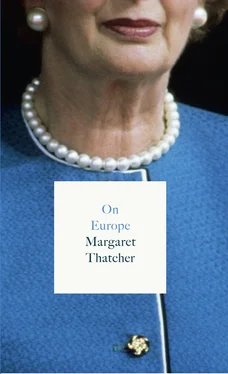‘Europe’ in anything other than a geographical sense is a wholly artificial construct. It makes no sense at all to lump together Beethoven and Debussy, Voltaire and Burke, Vermeer and Picasso, Notre Dame and St Paul’s, boiled beef and bouillabaisse , and portray them as elements of a ‘European’ musical, philosophical, artistic, architectural or gastronomic reality. If Europe charms us, as it has so often charmed me, it is precisely because of its contrasts and contradictions, not its coherence and continuity. It is difficult to imagine anything less likely to be moulded into a successful political unit than this extraordinarily uneven mix of unlike with like. I suspect that in actual fact even the most fanatical Euro-enthusiasts have, in their heart of hearts, understood this. They keep quiet about the fact and would protest the opposite, but actually they do not like the day-to-day human reality of Europe one bit. That is why they want to harmonise, regulate and twist it into something altogether different, rootless and shapeless that can be made to fit their utopian plans.
THE EUROPEAN ECONOMIC AND SOCIAL MODEL
To the extent that there is a ‘European’ identity it can best be perceived in what is often described as the European economic and social model. This model, though it comes in several somewhat different shapes and sizes, depending upon the politics of the Europeans concerned, is clearly distinct from and indeed sharply at odds with the American model. In order to illustrate the philosophy behind it, and so as not to confuse it with old-fashioned socialism, one can profitably consider some words of Edouard Balladur, the then French Prime Minister: ‘What is the market? It is the law of the jungle, the law of nature. And what is civilisation? It is the struggle against nature.’ 7
M. Balladur is an extremely sophisticated and intelligent right-of-centre French politician. But he clearly understands nothing about markets. Markets do not exist in a void. They require mutual acceptance of rules and mutual confidence. Beyond a certain level, only the state, setting weights, measures, rules and laws against fraud, profiteering, cartels and so on, can make markets work at all. Of course, the market – any market – implies limits upon the power of the state. In markets the initiative comes from individuals, the prices reflect supply and demand, and the outcomes are, by necessity, unpredictable. But to describe the operation of markets as barbaric shows a particularly shallow and unrealistic understanding of what constitutes Western civilisation and underpins Western progress.
In France, the hostility to markets – and particularly to the international markets through which nations trade with another – is very deep-rooted. It may be that there is something in the French psyche which reacts better than the British to a large measure of state control and high levels of regulation. Certainly, the quite successful performance of the French economy in recent decades might confirm that.
But the European economic model also has a German variant, and this, given Germany’s size and wealth, is the more important one. Whereas the French prefer statism – they invented the word, after all – the Germans incline to corporatism. They are not anti-capitalist, but their conception of capitalism – sometimes referred to as Rhenish capitalism – is one in which competition is limited, cartels are smiled upon, and a high degree of regulation is provided. Another aspect of this system is revealed by the term ‘social market’. This expression was coined by Ludwig Erhard, 8though I believe that he later came to dislike it because it was used to justify too much state interference and expenditure. For Germans nowadays it implies the provision of more generous social benefits than anyone in Britain, apart from those on the left of the Labour Party, would normally consider appropriate to a ‘safety net’. And indeed the Germans are still wrestling with the need to curb that spending.
What both the French and the Germans can agree upon, however, is that the sort of economic policies pursued in America, and to a large extent in Britain since 1979, are unacceptable. Thus, writing in Le Monde , the French and German Finance Ministers proclaimed: ‘The obsessive insistence of the neo-liberals on the deregulation of labour markets has contributed more to the blocking of reforms than to the creation of jobs. We are convinced that the European social model is a trump card, not a handicap.’ 9
In fact, a number of authoritative studies have quite convincingly proved the opposite. Examining the impact of moves in France and Germany to stimulate employment by limiting working hours, Keith Marsden noted that at the same time as the average number of hours worked had fallen, the two countries’ unemployment rates had risen. By contrast, in the United States where people were working longer, and in Britain where working hours had remained stable, there had been significant falls in unemployment. Similarly, early-retirement programmes in Europe had not made available more opportunities for younger workers: rather, the effect had been to increase social security taxes to support the retired – so burdening business. Finally, Mr Marsden noted:
There is a clear correlation between higher government expenditure and lower employment. In the US, the government share of GDP was twenty-two percentage points below that of France but its employment ratio was fifteen points higher. Britain’s public spending level was eight points below Germany’s, yet its employment ratio was seven points higher. 10
Another study of Europe’s social model by Bill Jamieson and Patrick Minford has highlighted the main economically harmful features of the European model: higher state spending, higher overall taxes, higher social security contributions – noting particularly the damaging burden this places on business – higher corporate taxes and higher levels of regulation, especially of labour markets. The results have been eminently predictable, but as an example of wilful self-damage no less shocking all the same: ‘The contrast with the United States is stark. Since 1970 the US economy has created almost fifty million new jobs, while the EU has created just five million.’ 11

EUROPE’S PENSIONS CRISIS
Another way of describing the difference between the European and the American models is to borrow a rather profound observation of Friedrich von Hayek. In The Road to Serfdom , first published in 1944, Hayek wrote:
[T]he policies which are now followed everywhere [in Europe], which hand out the privilege of security, now to this group and now to that, are nevertheless rapidly creating conditions in which the striving for security tends to become stronger than the love of freedom. The reason for this is that with every grant of complete security to one group the insecurity of the rest necessarily increases . 12[Emphasis added]
The European model epitomises precisely this: it places security above everything else, and in its persistence in eliminating risk it inevitably discourages enterprise. That is the basis of Europe’s pensions crisis, whose full implications are still not widely grasped.
Of course, in one sense the cause of the crisis is demography, the failure of much of Western society to reproduce. One can speculate about the causes for this and what it may tell us of contemporary values, attitudes and institutions. One can also debate whether and how policies might be changed to reverse long-term demographic decline. But such discussions, fascinating as they are, are irrelevant to the crisis much of Europe is facing now .
Читать дальше













